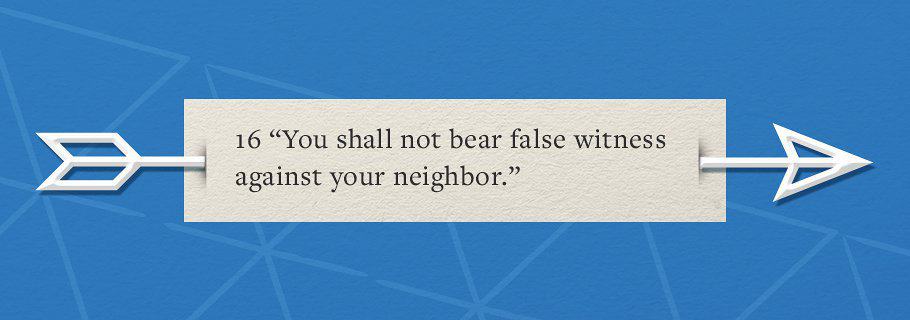You must be familiar with the ninth commandment: “You shall not bear false witness against your neighbor.” On a surface level it’s simple enough: Don’t tell lies about other people. But Christians have traditionally understood it to entail far more than this. With the rise of modern communications technologies, and especially social media, I am convinced we need to diligently apply ourselves to a fresh consideration of all this commandment requires of us.
I plan to do this in two parts and admit from the outset this was first an exercise I undertook for my own purposes. I had become convinced I was violating the spirit, even if not the letter, of this commandment, especially through social media. I wasn’t telling lies about other people, but I was reading lies. I wasn’t bearing false witness against brothers or sisters in Christ, but I also wasn’t deliberately protecting their names and reputations. I wasn’t deliberately writing rumors and half-truths, but I was seeking them out online. As a Christian in the Reformed tradition it is my instinct to take my questions and concerns to creeds, confessions, and catechisms, and in this case found assistance and guidance in the Westminster Larger Catechism.
Today I’ll begin a two-part examination of the ninth commandment in a social media world, looking first at the duties it requires and then at the sins it forbids. In each case I will share in bullet points each phrase of the Catechism. Beneath each phrase I will suggest questions that may foster application relevant to a world dominated by social media.
So here’s the challenge: Think of the people you follow on Twitter, the blogs you read, the news sites you browse, the videos you watch on YouTube, the friends you engage with on Facebook. Think of the topics you discuss with your family in the home and friends in the church. Think not only of what you say, but also what you read or listen to; the ninth commandment is not just meant to govern your mouth, but also your eyes, your ears, your heart, and your mind. And then consider the wisdom of the ages:
The Duties Required in the Ninth Commandment
The duties required in the ninth commandment are:
- the preserving and promoting of truth between man and man, and the good name of our neighbour, as well as our own;
- In what you say and what you read online, are you committed to promoting truth and to preserving and enhancing the reputation of others? Or are you willing to read rumors and innuendo, or to spend time reading, writing, or sharing things that tarnish reputations, especially of other believers?
- appearing and standing for the truth;
- Are you determined to stand for truth and to stand against error, not only in what you say but also in what you read? Or do you have a reputation for spreading rumors and lies? Do you find yourself drawn to reading material that is speculative or tainted with lies and half-truths?
- and from the heart, sincerely, freely, clearly, and fully, speaking the truth, and only the truth, in matters of judgment and justice, and in all other things whatsoever;
- Are you committed to reading, believing, and telling only what is verifiably true? Do you avoid sites, feeds, and accounts that share speculative rumors or outright lies?
- a charitable esteem of our neighbours;
- Do you demonstrate love and respect even for people with whom you disagree? Do the sites you read demonstrate that same kind of love and respect?
- loving, desiring, and rejoicing in their good name;
- Are you hopeful that other people will maintain a good reputation and do you rejoice in all that enhances their reputation as faithful Christians? Are you as quick to read, believe, and share information that will enhance their reputation as to tarnish it?
- sorrowing for, and covering of their infirmities;
- Do you feel grief (rather than mere outrage) over the sins and weaknesses of others and a willingness to overlook their offenses (when those offenses are not so egregious that they threaten to undermine the gospel of Christ)? Do you visit sites and read material committed primarily to exposing the transgressions of other people, and especially fellow believers
- freely acknowledging of their gifts and graces, defending their innocency;
- Do you rejoice in all evidences of God’s grace even as displayed in people with whom you have disagreements? Do the sites you read and the feeds you follow likewise show a desire to hear and spread good news about others and to rejoice in all that is good and delightful? Do you defend people who are unjustly treated?
- a ready receiving of a good report, and unwillingness to admit of an evil report, concerning them;
- Do you love to receive a good report about another believer, even one with whom you have substantial disagreements? Do you refuse to receive an evil report on another believer, especially when that information is unsubstantiated or no business of yours? Do you shut down gossip when someone attempts to communicate it to you? Do you idly chat with friends or family members about others in such a way that you actually spread evil reports about them?
- discouraging tale-bearers, flatterers, and slanderers;
- Do you refuse to hear or to read the words of people who tell tales, who spread gossip, or who slander others. Or do you find yourself curious to know what tale they are telling now, what gossip they are spreading, what slander they are leaking? Do you proactively avoid such people? Do you avoid reading bad news about people and situations that have no bearing on your life, your church, or your ministry?
- love and care of our own good name, and defending it when need requireth;
- Do you protect your own reputation, and even defend it when necessary, so you remain above reproach in the eyes of others?
- keeping of lawful promises;
- studying and practicing of whatsoever things are true, honest, lovely, and of good report.
- Is the focus of what you do, say, read, and watch those things God declares to be true, honest, lovely, and of good report? Or do you find yourself drawn to what is false, dishonest, evil, and disreputable? Do you make excuses as to why you need to know information that is evil or unhelpful or unverifiable or potentially false?
Now, let’s be clear. The ninth commandment is not the only commandment, so we do not obey it at the expense of what is required or forbidden by the other nine or by the rest of God’s Word. Neither is it the only word on our relationship to other people and certainly there are times we must investigate what others have said or done and certainly there are times we must even condemn others for their actions or convictions. Yet only good can come by carefully studying the commandment and diligently applying it to our whole lives, including our use of social media.
In the next article we will turn to the sins that are forbidden by the ninth commandment.










